Looking for ways to add more high iron foods into a plant-based diet? Look no further than these tasty iron-rich energy bites, perfect as a snack or even a dessert.
We combine some of the best plant-based sources of iron with chocolate and coconut for a tasty iron boost. They’re easy to customize with your favorite nuts and seeds, and the best part is that they store well in the freezer.
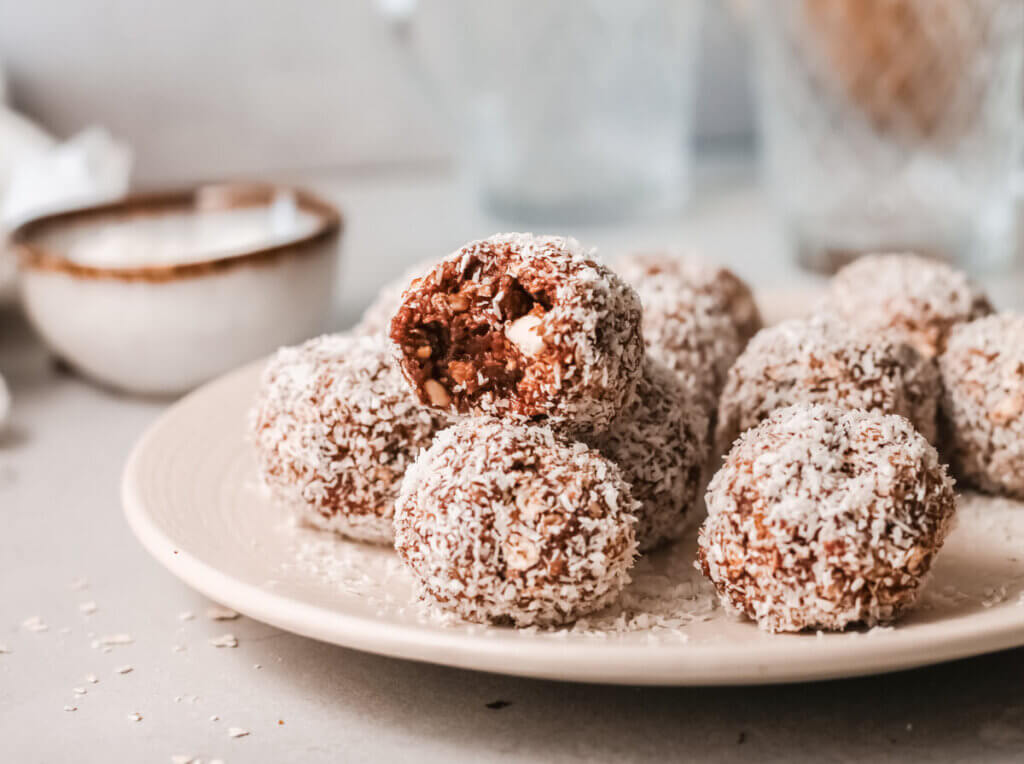
Iron deficiency anemia in Chronic Kidney Disease
Anemia is a common concern for people with kidney disease. Anemia occurs when there is a lower than normal amount of red blood cells, also known as hemoglobin. Hemoglobin has the important job of carrying oxygen to organs and tissues throughout the body.
One of the major causes of anemia for people with kidney disease is because the kidneys produce the hormone erythropoietin. This hormone signals the bone marrow to generate red blood cells. When kidneys are damaged, they make less erythropoietin.
Vitamin and mineral deficiencies can also cause anemia. Iron is the building block of hemoglobin, therefore, iron deficiency is a major cause of anemia. Other vitamin deficiencies that can cause anemia include Vitamin B12 and Folate.
Knowing your numbers
If you have kidney disease, you’ll likely have a complete blood count (CBC) checked regularly to monitor for anemia. In addition, your doctor may order blood tests that identify an iron deficiency. These tests include:
- Ferritin– measures stored iron in the blood
- Transferrin Saturation– measures how much stored iron can be used to make new red blood cells
Your healthcare provider may also check for low levels of Vitamin B12 and Folate.
Including iron rich foods to help support kidney health
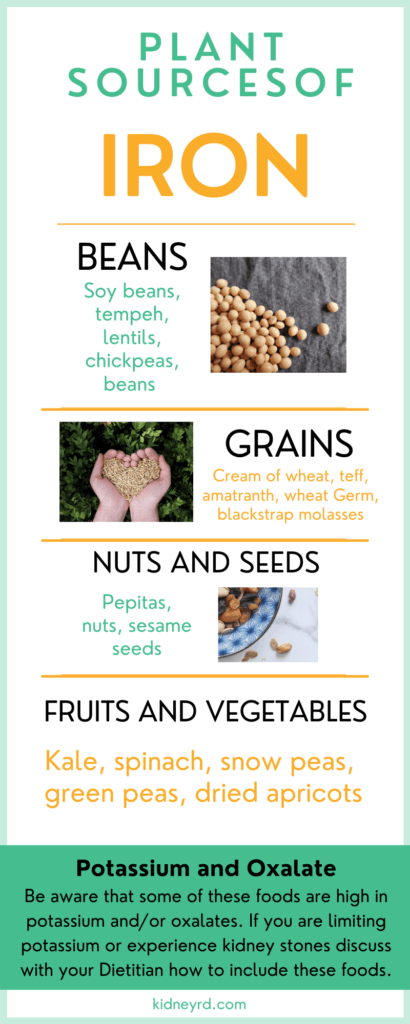
Sometimes it’s necessary to use Iron and B Vitamin supplements to help resolve vitamin deficiencies. In addition, it’s important to support kidney health by using the power of nutrition!
One of our strategies for boosting iron intake is adding a variety of plant-based sources of iron. Plant-based sources of iron are called non-heme iron, while animal sources of iron are called heme iron.
Non-heme iron is not absorbed as well as heme iron, however, we recommend choosing mostly plant-based sources because diets high in animal protein are correlated with faster progression of CKD.
Combine iron rich foods with high Vitamin C foods
Another strategy that helps to boost the absorption of iron in foods is to combine them with Vitamin C-rich foods.
There are so many yummy sources of Vitamin C other than oranges! Some of our lower potassium favorites are:
- Sweet bell peppers
- Strawberries
- Cabbage
- Pineapple
- Broccoli and cauliflower
- Mango
Want a printout of iron-rich and high vitamin C foods? Check out our helpful handout that includes combination meals that boost iron absorption!
Cooking tools to help increase your iron intake
Did you know that there are cooking tools that can add iron to your food? Yep! It can be as easy as sautéing vegetables using a cast-iron skillet or dropping a lucky iron fish into your pot of boiling water or soup.
These cooking tools are essential for anyone struggling with iron deficiency anemia, and in our opinion, food just tastes better when cooked on cast iron!
Want to learn more about how food and nutrition can optimize kidney health?
Join our monthly class or book a consultation with one of our expert Renal Dietitians to find out how we use the power of nutrition to help preserve or even improve kidney function.
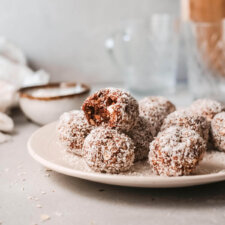
Delicious Iron Rich Chocolate Bites
Ingredients
- 1 cup dried apricots
- 1 cup unsalted roasted cashews
- ¾ cup unsweetened shredded coconut divided
- 2½ oz dark chocolate chips about 6 tablespoons
- A pinch of salt to taste
Instructions
- Place dried apricots in a bowl. Add enough hot water to submerge the apricots and let soak for about 10 minutes until slightly softened.
- Add dried apricots to a blender or food processor. Blend to a fine mixture or a rough paste. Stop and scrape the sides as needed.
- Add the roasted cashews, ½ cup shredded coconut, dark chocolate chips, and a pinch of salt to the blender or food processor. Pulse until the nuts are broken up into small pieces and the mixture is well combined.
- Pour out mixture into a plate and shape into 20 small balls with slightly damp hands.
- Transfer the remaining shredded coconut onto a plate and roll the balls in the shredded coconut to coat.
- Enjoy immediately or store in an airtight container in the fridge for up to a week or in the freezer for up to one month.
- Variations
- Personalize It: Feel free to use your favorite seeds or nuts in this recipe. Cashews, pine nuts, pistachios, sunflower seeds, and sesame seeds are some higher iron nuts and seeds.
- Lower Potassium: halve the serving size to 1 bite.
Notes
Nutrition
KidneyRD Verdict
These yummy little morsels did not last long in our house, my entire family gobbled them up! We loved the sweetness combined with the tang of the dried apricots and the texture of all of the nuts. They were a little bit crumbly right after rolling into balls, putting them in the fridge for about an hour helped them set and hold their shape. I’ll be keeping these stocked in the fridge or freezer for a healthy and delicious iron-rich snack!
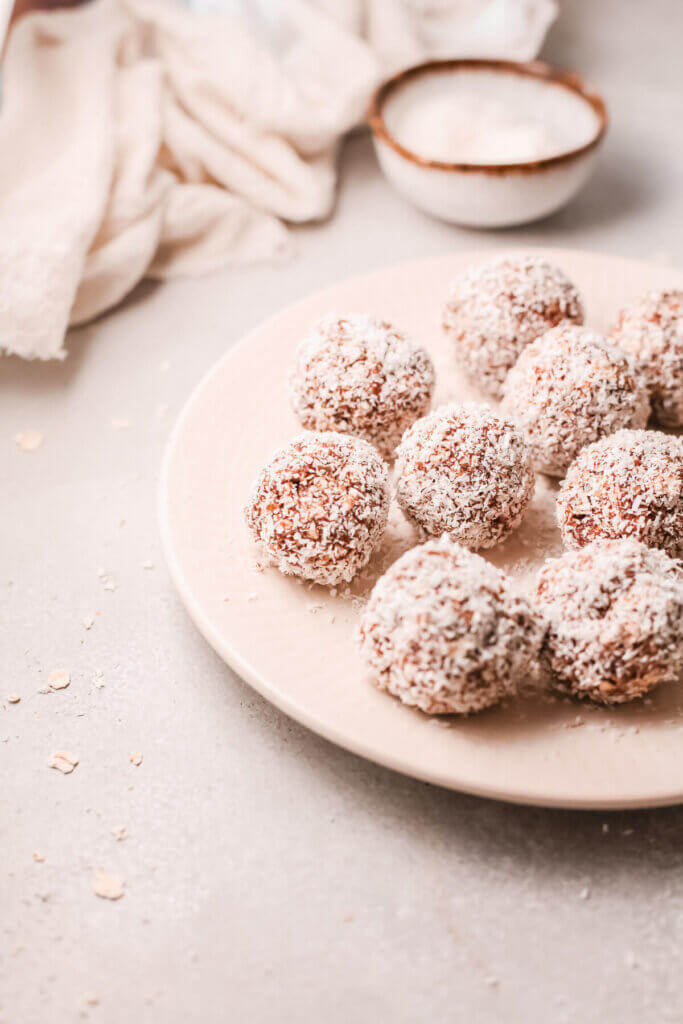
ALL information you read on KidneyRD.com is purely for informational and educational purposes. Information is not intended to treat, cure or prevent any disease.

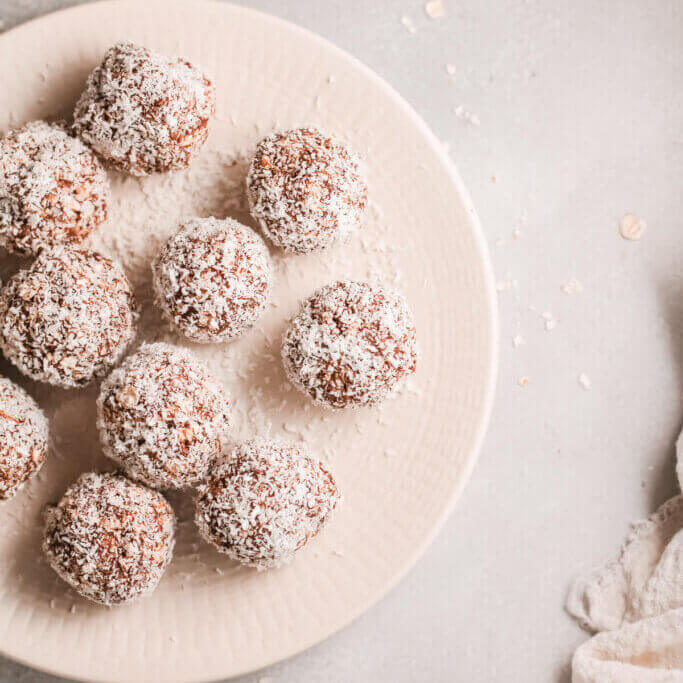
I was wondering if you have more recipes for RD patients that have anemia? I would be very grateful.
Hi Carol,
While we don’t have any recipes for anemia specifically, we’d recommend some of the recipes that use plant-based sources of iron such as nuts, and beans.
If you’d like to dive deeper and work one-on-one with an expert Renal RD that can help you manage anemia, you can schedule a complimentary discovery call.
Pingback: 40 BEST Fruit-Forward, Plant-Based Dessert Recipes - Sharon Palmer, The Plant Powered Dietitian
Pingback: Low Sodium Creamy Mixed Vegetable Soup - Kidney RD